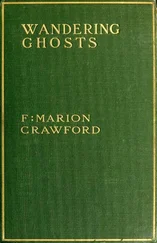F. Crawford - Via Crucis
Здесь есть возможность читать онлайн «F. Crawford - Via Crucis» весь текст электронной книги совершенно бесплатно (целиком полную версию без сокращений). В некоторых случаях можно слушать аудио, скачать через торрент в формате fb2 и присутствует краткое содержание. Жанр: Исторические приключения, на английском языке. Описание произведения, (предисловие) а так же отзывы посетителей доступны на портале библиотеки ЛибКат.
- Название:Via Crucis
- Автор:
- Жанр:
- Год:неизвестен
- ISBN:нет данных
- Рейтинг книги:3 / 5. Голосов: 1
-
Избранное:Добавить в избранное
- Отзывы:
-
Ваша оценка:
- 60
- 1
- 2
- 3
- 4
- 5
Via Crucis: краткое содержание, описание и аннотация
Предлагаем к чтению аннотацию, описание, краткое содержание или предисловие (зависит от того, что написал сам автор книги «Via Crucis»). Если вы не нашли необходимую информацию о книге — напишите в комментариях, мы постараемся отыскать её.
Via Crucis — читать онлайн бесплатно полную книгу (весь текст) целиком
Ниже представлен текст книги, разбитый по страницам. Система сохранения места последней прочитанной страницы, позволяет с удобством читать онлайн бесплатно книгу «Via Crucis», без необходимости каждый раз заново искать на чём Вы остановились. Поставьте закладку, и сможете в любой момент перейти на страницу, на которой закончили чтение.
Интервал:
Закладка:
A sweet low laugh rang out into the summer air just above his head. He looked up to meet the sound, and young Henry missed the ball and turned his eyes in the same direction. His bluff, boyish face blushed scarlet, but Gilbert turned slowly pale, stepped back, and took his round pointed cap from his fair hair in acknowledgment of the Queen's presence.
"You were listening, Madam," cried the boy, red in his anger. "But I am glad you did, since you have heard the truth."
The Queen laughed again, and drew back her head as if to see whether there were any one in the room behind her, her white hand lying over the stone sill, meanwhile, as if to show that she was not going away. Gilbert even thought that the slender fingers tapped the stone ledge in a reassuring way. Then she looked out again. A few late flowers and sweet herbs grew in an earthenware trough in one division of the window. There was sweet basil and rosemary, and a bit of ivy that tried to find a hold upon the slender column, and, partly missing it, hung down over the window-ledge. A single monthly rose made a point of colour among the sweet green things.
The Queen was still smiling as she rested her elbows upon the sill and her chin on her folded hands. She was near enough to the tennis-players to be heard by them if she spoke in a low tone.
"Are you angry because Master Gilbert is frightened?" she asked, looking at Henry. "Or are you frightened because his lordship, the Count of Anjou, is angry?" she inquired, turning her eyes to Gilbert.
He smiled at her way of opening the conversation, but Henry thought that she was laughing at him and grew redder than ever. Not deigning to answer, he picked up the ball and served it over the penthouse to himself, striking it back cleverly enough. The Queen laughed again as he kept his face resolutely turned from her.
"Will you teach me to play, if I come down to you?" she asked, looking at the back of his head.
"It is no game for women," answered the boy, rudely, and still keeping the ball up.
"Will you give me a lesson, Master Gilbert?"
The laughing eyes were suddenly grave as they turned to the young Englishman, the smiling lips grew tender, and the voice was gentle. Without turning round, Henry felt the change and knew that she was looking at his friend; he served the ball with a vicious stroke that brought it back too high for him. Without turning his head to see where it had rolled, the angry boy walked off, picked up his tunic, which lay on the turf at a little distance, threw it over his arm, jammed his pointed cap upon his head with his other hand, and departed in offended dignity.
The Queen smiled as she looked after him, but did not laugh again.
"Will you teach me to play tennis?" she asked of Gilbert, who was hesitating as to what he should do. "You have not answered me yet."
"I shall at all times do your Grace's bidding," answered Gilbert, inclining his head a little and making a gesture with the hand that held his cap as if to put himself at her disposal.
"At all times?" she asked quietly.
Gilbert looked up quickly, fearing lest he might be tricked into a promise he did not understand, and he did not answer at once. But she would not repeat the question.
"Wait," she said, before he spoke. "I am coming down."
With an almost imperceptible gesture, like a greeting, she disappeared. Gilbert began to walk up and down, his hands behind him, his eyes on the ground, and he did not see the tennis-ball which Henry had lost until he almost stumbled over it. The boy's words had roused an entirely new train of ideas in his mind. Perhaps no man could be so free from vanity as not to be pleased, even against his will, with the thought that the most beautiful living woman, and she a queen, was in love with him. But whatever satisfaction of that sort Gilbert may have felt was traversed in an opposite direction by the cool sense of his own indifference. And besides, that was a simple age in which sins were called by their own names and were regarded with a sort of semi— religious, respectful abhorrence by most honest gentlemen; and what was only the general expression of a narrow but high morality had been branded upon Gilbert's soul during the past months in letters that were wounds by the ever-present memory of his own mother's shame.
The confusion of his reflections was simplified by the appearance of Queen Eleanor. At the window of the lower story, which opened to the ground, she stepped out, looked up and down the deserted yard, and then came towards him. Gilbert had been long enough in Paris to understand that Queen Eleanor had not the slightest regard for the set rules, formal prejudices, and staid traditions of her husband's court; and when King Louis gravely protested against her dressing herself in man's mail, bestriding his own favourite charger, and tilting at the Saracen quintain in the yard, she hinted with more or less good or ill nature, according to her mood, that her possessions were considerably more extensive than the kingdom of France, and that what she had been taught to do by William of Aquitaine was necessarily right, and beyond the criticism of Louis Capet, who was descended from a Paris butcher. Nevertheless, the Englishman had some reasonable doubts and misgivings at finding himself, a humble squire, alone in that quiet corner with the most beautiful and most powerful of reigning queens. But she, whose quick intuition was a gift almost beyond nature, knew what he felt before she had reached his side. She spoke quite naturally and as if such a meeting were an everyday occurrence.
[Illustration: "PERHAPS THAT IS ONE REASON WHY I LIKE YOU"]
"You did not know that the window was mine?" she said quietly. "I saw how surprised you were when I looked out. It is a window of a little hall behind my room. There is a staircase leading down. I often come that way, but I hardly ever look out. To-day as I was passing I heard that silly child's angry voice, and when I saw his face and heard what he said, I could not help laughing."
"The young Count is in earnest," said Gilbert, quietly, for it would have seemed disloyal to him to join in the Queen's laughter.
"In earnest! Children are always in earnest!"
"They deserve the more respect," retorted the Englishman.
"I never heard of respecting children," laughed the Queen.
"You never read Juvenal," answered Gilbert.
"You often say things which I never heard before," answered the Queen. "Perhaps that is one reason why I like you."
She stopped and leaned against the penthouse, for they had reached the corner of the court, and she thoughtfully bit a sprig of rosemary which she had picked from her window in passing. Gilbert could not help watching the small white teeth that severed the little curling grey leaves like ivory knives, but the Queen's eyes were turned from him and were very thoughtful.
Gilbert deemed it necessary to say something.
"Your Grace is very kind." He bowed respectfully.
"What makes you so sad?" she asked suddenly, after a short pause, and turning her eyes full upon him. "Is Paris so dull? Is our court so grave? Is my Gascony wine sour, that you will not be merry like the rest, or"-she laughed a little-"or are you not treated with the respect and consideration due to your rank?"
Gilbert drew himself up a little as if not pleased by the jest.
"You know well that I have no rank, Madam," he said; "and though it should please you to command of me some worthy deed, and I should, by the grace of God, deserve knighthood, yet I would not have it save of my lawful sovereign."
"Such as teaching me to play tennis?" she asked, seeming not to hear the end of his speech. "You should as well be knighted for that as for any other thing hard to do."
"Your Grace is never in earnest."
"Sometimes I am." Her eyelids drooped a little as she looked at him. "Not often enough, you think? And you-too often. Always, indeed."
Читать дальшеИнтервал:
Закладка:
Похожие книги на «Via Crucis»
Представляем Вашему вниманию похожие книги на «Via Crucis» списком для выбора. Мы отобрали схожую по названию и смыслу литературу в надежде предоставить читателям больше вариантов отыскать новые, интересные, ещё непрочитанные произведения.
Обсуждение, отзывы о книге «Via Crucis» и просто собственные мнения читателей. Оставьте ваши комментарии, напишите, что Вы думаете о произведении, его смысле или главных героях. Укажите что конкретно понравилось, а что нет, и почему Вы так считаете.










